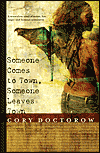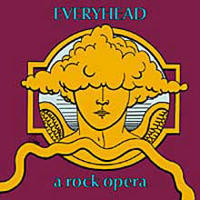Item two: in his latest novel, Someone Comes to Town, Someone Leaves Town, Cory Doctorow presents an impressive case for a new system of intellectual property that uses the Napster/Grokster model as an example of how good things can come only from such grass-roots file sharing, and not from the big music companies.
 Here's the situation Doctorow's character Kurt describes as the current state of the music industry:
Here's the situation Doctorow's character Kurt describes as the current state of the music industry:"It's like the deleted music that you can't buy today, except at the bottom of bins at Goodwill or at yard sales. Tons of it has accumulated in landfills. No one could afford to pay enough people to go around and rescue it all and figure out the copyrights for it and turn it into digital files and upload it to the net -- but if you give people an incentive..."
Kurt goes on to discuss P2P:
"No label could have afforded to [digitize all of their out-of-print recordings], but the people just did it for free... So it's not cost effective for some big corporation to figure out how to use or sell these -- so what? It's not cost-effective for some big dumb record label to figure out how to keep music by any of my favorite bands in print, either. We'll figure it out."
The point here is that companies need to envision a profit before they go out on a limb, and won't do anything that doesn't have a big upside to their wallets. Us little people, however, can effect even more progress by acting indiviidually toward a common goal.
 In this theoretical case, I upload the soundtrack to the 1975 rock opera "Everyhead" and put it, theoretically, on my mp3 blog. Fred sees it, and theoretically downloads it. Meanwhile, Sarah has theoretically downloaded a BitTorrent of some 78s featuring original Amos and Andy episodes from Fred's theoretic page. No one is going to keep pressing vinyl or burning discs at the corporate level for these folks to get what they want, but they will willingly trade with each other to get it. And that's how this thing is going to keep going -- people want this stuff, and this stuff wants to be heard (it's a wacky extension of meme theory, but I think it's valid). Trying to slow this down or stop it is just so paleolithic.
In this theoretical case, I upload the soundtrack to the 1975 rock opera "Everyhead" and put it, theoretically, on my mp3 blog. Fred sees it, and theoretically downloads it. Meanwhile, Sarah has theoretically downloaded a BitTorrent of some 78s featuring original Amos and Andy episodes from Fred's theoretic page. No one is going to keep pressing vinyl or burning discs at the corporate level for these folks to get what they want, but they will willingly trade with each other to get it. And that's how this thing is going to keep going -- people want this stuff, and this stuff wants to be heard (it's a wacky extension of meme theory, but I think it's valid). Trying to slow this down or stop it is just so paleolithic.

No comments:
Post a Comment